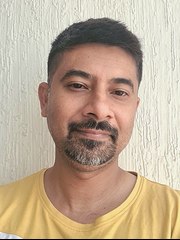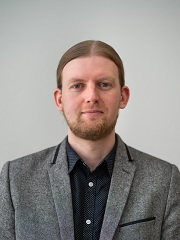Lectures
Below you will find detailed information about the lectures and the lecturers.
26 Jan - Wyke Stommel (Radboud University)
'Shared care' through instant messaging updates in youth care: a digital conversation analysis

Wyke Stommel is an associate professor for Language and Communication at the Centre for Language Studies, Radboud University. Her research concerns spoken and (written/video) mediated communication using conversation analysis. Varying from video consultations in the medical domain to instant messaging in social care, remote video-based paramedical care for infants and interaction with robots my interest lies with how interactants achieve goals, construct identities and build relationships in unfolding interaction verbally and non-verbally. Regardless of the type of mediation, I am interested in how the technology is exploited by participants in the interaction. Together with others I developed the idea of “digital conversation analysis”, which sprang from the Microanalysis Of Online Data (MOOD) network. I have also written about methodological aspects of research, such as the ethics of research on digital/online data. I am an affiliate of Radboud iHub for Digitalisation and Society.
Abstract
In this presentation, I focus on WhatsApp interactions in a specific institutional but hybrid setting, namely family-style group care, to showcase what microanalysisof digital interaction has to offer. In family-style group care, young people temporarily live in the family of professional fosterparents (PFP), while they regularly visit their birth parents (BPs). The data consist of instant messaging conversations between 11 pairs of PFPs and BPs during two months. Using Conversation Analysis (CA), we focused on the social interaction between BPs and PFPs, achieved in and through multimodally constructed sequences of updates-responses. Updates are used by BPs in the context of the transfer from the youngster from/to the PFP to display responsibility towards the PFP and for the youngster. Also, PFPs use updates to provide BPs quasi-primary access to the experiences of the youngster, centrally by sending images. Across these functions, we observe specific social actions of BPs and PFPs; while BPs work to display responsibility, PFPs subtly empower BPs as parents.
23 Feb - Joseph Sung-Yul Park (National University of Singapore)
Political economy of digital language and the metapragmatics off fansubbing

Joseph Sung-Yul Park is a Professor in the Department of English, Linguistics, and Theatre Studies, National University of Singapore. His work explores various issues of language in the context of globalization, including language and transnationalism, English as a global language, and political economy of language under neoliberalism. His latest book is In Pursuit of English: Language and Subjectivity in Neoliberal South Korea (Oxford University Press, 2021).
Abstract
While previous sociolinguistic research on digital language and communication has highlighted problems of inequality regarding access and linguistic diversity, less attention has been paid to how digital mediation of discourse opens up new markets for capital and its commodification of language. In this talk, I argue that a focus on the political economy of digital media communication can offer not only a cogent point of criticism against capitalist appropriation of language, but also a useful basis for asking fundamental questions about the nature of language and communication in digital media. For this, I consider how the digitally mediated work of fansubbing — fans’ creation and circulation of unauthorized subtitles for audiovisual media content — becomes a site of tension for regimes of intellectual property. Taking a metapragmatic perspective, I show that what lies at the heart of such tension is the question of how instances of digital language such as fansubs can be characterized — either as decontextualizable chunks of discourse that can be subjected to market-based exchange, or as embodied communicative practice that cannot be extracted from its social and material embeddedness.
23 Mar - Malvina Nissim (University of Groningen)
What language technology has to say about us

Malvina Nissim holds a Chair in Computational Linguistics and Society at the University of Groningen, The Netherlands. Her research focuses both on language modelling aspects as well as on the impact that language technology has on society. She's thus also regularly involved in outreach activities, and is a member of the ACL Ethics Committee. She graduated in Linguistics from the University of Pisa, and obtained her PhD in Linguistics from the University of Pavia. Before joining the University of Groningen, she was a tenured researcher at the University of Bologna (2006-2014), and a post-doc at the Institute for Cognitive Science and Technology in Rome (2006) and at the University of Edinburgh (2001-2005). She is the 2016 University of Groningen Lecturer of the Year.
Abstract
Tools based on Language Technology, or Natural Language Processing, are by now part of daily life, both in the personal realm as well as in the work-related arena. Recommender systems on social media, automatic translators, job application assessors are just some examples.
All of such tools are built through massive exposure to texts that people at large have produced: as books, news, posts on social media, and anything really which has been published on the internet. What kind of information about us, both as individuals and as members of the society which we live in, is thus implicitly captured (and reproduced) by such tools via the language we use? Considering that people engage with these tools daily, often even unknowingly, what are the advantages and the risks associated with them, both in terms of potential misuse and representativity of (slices of) humanity?
I will unpack such questions discussing some relevant NLP tasks; I will zoom in on bias, showing how it can be found in models, algorithms, data, society, and - importantly - in ourselves, too. I will critically reflect on these aspects by interacting as much as possible with the audience.
27 Apr - Rodney H. Jones (University of Reading)
Indexicality, virality and the entangled speech chains of TikTok

Rodney H. Jones is Professor of Sociolinguistics at the University of Reading. His research interests include digital literacies, language and embodiment, and the sociolinguistics of surveillance. His most recent books include Understanding Digital Literacies 2nd edition (with Christoph Hafner, Routledge 2021), and Introducing Language and Society (with Christiana Themistocleous, Cambridge 2022).
Abstract
One of the key affordances of TikTok is the ability it gives to users to reuse the sounds from other people’s videos, spawning what Abidin and Kaye (2021) call ‘audio memes’, in which voices originally from one body are inserted into the bodies of others in the form of ‘lip-syncing’ performances. Like visual memes, audio memes often derive their humour from the incongruency between the two elements combined, in this case the social identity indexed by the voice and the identity of the body performing it. At the same time, such performances inevitably involve ‘metapragmatic stance-taking’ (Spitzmüller, 2015), where the bodily performance functions as a commentary not just on the voice, but also on the person (or type of person) who produced it. In cases where people appropriate voices from people of social groups different from their own, this practice can perpetuate stereotypes and enact symbolic violence against the original speaker or the social group they belong to. As with other kinds of memes, however, the complex, discordant, and sometimes random- seeming indexicalities created through these recombinations can make it difficult to understand how this symbolic violence operates and how to respond to it. Drawing on recent work on the embodied and affective dimensions of sociolinguistic variation (Eckert, 2019; Pratt, 2018), this talk argues that understanding the kinds of meanings generated by audio memes, as well as why they ‘go viral’, requires that we attend not just to indexicality, but also to iconicity, in particular how the recombination of bodily qualia such as voice quality, articulatory setting, facial expression and gesture, come to communicate embodied affects, which, on the one hand become central to the sensual experience of participating in the meme, and on the other, imbue the appropriated voice with a ‘moral flavour’ (Gal, 2013) by creating or reinforcing associations between particular affects and particular embodied identities.
11 May - Michele Zappavigna (UNSW Sydney)
Emoji as paralanguage: modelling emoji-text relations and exploring ambient affiliation in social media discourse

Michele Zappavigna is Associate Professor in the School of Arts and Media at the University of New South Wales. Her major research interest is in exploring ambient affiliation in the discourse of social media using social semiotic, multimodal, and corpus-based methods. She is a co-editor of the journal Visual Communication. Key books include Searchable Talk: Hashtags and Social Media Metadiscourse (2018) and Discourse of Twitter and Social Media (2012). Recent co-authored books include Researching the Language of Social Media (2014; 2022), Modelling Paralanguage Using Systemic Functional Semiotics (2021), and Emoji and Social Media Paralanguages (Cambridge University Press, forthcoming).
Abstract
This presentation introduces a social semiotic framework for exploring the intermodal functions of emoji in digital discourse. The framework models emoji as a form of paralanguage, and as such, highly dependent on their linguistic co-text for making meaning. Developed via corpus-based studies of digital messaging and social media discourse (Logi & Zappavigna, 2021; Zappavigna & Logi, 2021), the framework is soon to be encapsulated as Zappavigna and Logi (forthcoming), and draws on emerging social semiotic work on paralanguage (Ngo et al., 2021). It adopts a metafunctional approach to three kinds of emoji-text convergence whereby emoji make meaning with their co-text: ideational concurrence, interpersonal resonance, and textual synchronicity. The presentation will provide an overview of the systems that have been created to encapsulate each of these three patterns of relations. It will also explore how the framework can be used to understand ambient affiliation practices in social media discourse, drawing on Twitter and TikTok comment corpora.
08 Jun - Scott Kiesling (University of Pittsburgh)
Enregistering 'Frat Boy' on social media

Scott F. Kiesling is Professor of Linguistics at the University of Pittsburgh, USA. His research focuses on the ways that identities, particularly masculinty, place, and heterosexual identities, affect language change, and how such identity categories are discursively constructed. He is the author of Language, Gender and Sexuality: An Introduction (2019), “Masculine stancetaking and the linguistics of affect: On masculine ease.” (2018), Pittsburgh Speech and Pittsburghese (co-author, 2015), and “Dude” (2004).
Abstract
The ‘frat boy’ is a mediatized figure related to a social role and based on identities of young men who are members of “Greek letter societies” on college campuses in the United States. In this lecture, I inspect multiple representations, imitations, and parodies of the 'frat boy' figure, and what lessons it provides for ‘digital’ sociolinguistics. Specifically, I address:
- How are ‘frat boy’ figures created, through language and in combination with other semiotic modes?
- When people perform these voices in person, are they similar at all to the digital performed voices? What variation is present and why? How do the affordances of different media platforms affect these performances?
- The ‘frat boy’ represents a figure of hegemonic masculinity and people with privilege in the US. Does social media parody chip away at the hegemonic power enjoyed by most of the men in fraternities?
28 Sep - Monojit Choudhury & Sunayana Sitaram (Microsoft)
Code-mixing on social media: Understanding when, why and how speakers mix languages
 Monojit Choudhury is currently a Principal Applied Scientist at Microsoft Turing, and previously was a Principal Researcher at Microsoft Research Lab India. His research interests span various aspects of natural language processing and cognitive sciences, including multilingual models, ethics of NLP and AI, and NLP for social good. Dr. Choudhury is a Professor of Practice at Plaksha University and had previously served as adjunct faculty at IIIT Hyderabad and IIT Kharagpur. He is the general chair of the Panini Linguistics Olympiad, which is the Indian national linguistics Olympiad for high school students, and the founding chair of the Asia Pacific linguistics Olympiads. Dr. Choudhury has a PhD and BTech in Computer Science and Engineering from IIT Kharagpur.
Monojit Choudhury is currently a Principal Applied Scientist at Microsoft Turing, and previously was a Principal Researcher at Microsoft Research Lab India. His research interests span various aspects of natural language processing and cognitive sciences, including multilingual models, ethics of NLP and AI, and NLP for social good. Dr. Choudhury is a Professor of Practice at Plaksha University and had previously served as adjunct faculty at IIIT Hyderabad and IIT Kharagpur. He is the general chair of the Panini Linguistics Olympiad, which is the Indian national linguistics Olympiad for high school students, and the founding chair of the Asia Pacific linguistics Olympiads. Dr. Choudhury has a PhD and BTech in Computer Science and Engineering from IIT Kharagpur.
 Sunayana Sitaram is a Principal Researcher at Microsoft Research India. Her research goal is to improve the inclusivity of AI by enhancing the accuracy and safety of LLMs in non English languages. Her current research focus is on the evaluation of Large Language Models in non-English languages across dimensions of quality, safety and task completion. Sunayana also serves as the Director of the MSR India Research Fellow program which provides an exceptional opportunity for students considering a research career by exposing them to a world class research environment and providing mentorship from some of the world's top researchers. She has organized several conferences, workshops and special sessions, including IWSDS 2023 special sessions on code-switching at Interspeech 2016, 2018, CALCS 2020, 2021, 2022 SUMEval 2022, and has given several invited talks in both academia and industry. She served as the co-chair of the Industry track at ACL 2023 and the Senior Area Chair of the Multilingualism track at ACL 2023 and EMNLP 2023.
Sunayana Sitaram is a Principal Researcher at Microsoft Research India. Her research goal is to improve the inclusivity of AI by enhancing the accuracy and safety of LLMs in non English languages. Her current research focus is on the evaluation of Large Language Models in non-English languages across dimensions of quality, safety and task completion. Sunayana also serves as the Director of the MSR India Research Fellow program which provides an exceptional opportunity for students considering a research career by exposing them to a world class research environment and providing mentorship from some of the world's top researchers. She has organized several conferences, workshops and special sessions, including IWSDS 2023 special sessions on code-switching at Interspeech 2016, 2018, CALCS 2020, 2021, 2022 SUMEval 2022, and has given several invited talks in both academia and industry. She served as the co-chair of the Industry track at ACL 2023 and the Senior Area Chair of the Multilingualism track at ACL 2023 and EMNLP 2023.
Abstract
Code-mixing or Code-switching refers to the mixing of two or more languages in a conversation or even within an utterance It is prevalent in all multilingual society. Through small-scale qualitative user studies, sociolinguists have identified a wide range of patterns and factors influencing code-mixing. However, with a deluge of user generated content on the Internet, especially on social media, it is now possible to study the nature of this phenomenon quantitatively at a global scale In this lecture, we will cover a wide range of natural language processing techniques that allow us to study code-mixing at scale and present several fascinating discoveries about when, why, and how speakers across the world mix languages.
26 Oct - Britta Schneider (European University Viadrina)
Linguistic governmentality and media technologies: How is language ordered in the age of large language models?

Britta Schneider is Professor of Language Use and Migration at European University Viadrina, Germany. Her main research interest is language ideology research, with a focus on the discursive and material construction of languages in transnational, multilingual settings and in digital culture. She is chair of the working group ‘Ideologies, Beliefs, Attitudes’ of the COST Network Language in the Human-Machine Era and received a PhD from Goethe Universität Frankfurt am Main, Germany, and from Macquarie University Sydney, Australia. Key publications include Salsa, Language and Transnationalism (2014), “Methodological nationalism in linguistics” (Language Sciences, 2019), “The sociolinguistics of late modern publics” (Journal of Sociolinguistics, with Theresa Heyd, 2019), and “Multilingualism and AI – the regimentation of language in the age of digital capitalism” (Signs and Society, 2022).
Abstract
In this talk, I explore how linguistic governmentality – normative discourses on language, multilingualism and linguistic diversity – is reconfigured in the age of large language models. Traditional ideas about how to govern language are mostly based on modernist-national epistemologies, constituted in cultures of writing, in which languages are understood as rule-based abstract systems of denotational signs organized according to territorial communities. This contrasts with the language cultures and concepts that come into being in the age of AI language models. Here, ‘languages’ are treated as datasets, whose algorithmic exploitation serves commercial and political interests, embedded in neoliberal practices but also in democratic discourses. What are the effects of this on sociolinguistic hierarchies, processes of community formation, and on minority language policies? What happens to modernist ideas of languages as abstract systems and what are new forms of linguistic resistance?
23 Nov - Camilla Vasquez (University of South Florida)
The big ask: Requesting consumer feedback
 Camilla Vásquez is Professor of Applied Linguistics in the Department of World Languages at the University of South Florida, where she directs the Linguistics and Applied Language Studies (LALS) doctoral program. She is the author of The Discourse of Online Consumer Reviews (Bloomsbury, 2014) and Language, Creativity and Humour Online (Routledge, 2019). Her most recent book is the edited volume, Research Methods for Digital Discourse Analysis (Bloomsbury, 2022). Camilla’s research on digital business communication, online identities, and linguistic creativity has been published in venues such as Current Issues in Tourism, Discourse Context & Media, Food & Foodways, Intercultural Pragmatics, Internet Pragmatics, Journal of Pragmatics, Journal of Sociolinguistics and Narrative Inquiry. She currently serves as Associate Editor of Discourse Context & Media and is a co-editor (with Carmen Lee) of the Routledge book series Language and Digital Media.
Camilla Vásquez is Professor of Applied Linguistics in the Department of World Languages at the University of South Florida, where she directs the Linguistics and Applied Language Studies (LALS) doctoral program. She is the author of The Discourse of Online Consumer Reviews (Bloomsbury, 2014) and Language, Creativity and Humour Online (Routledge, 2019). Her most recent book is the edited volume, Research Methods for Digital Discourse Analysis (Bloomsbury, 2022). Camilla’s research on digital business communication, online identities, and linguistic creativity has been published in venues such as Current Issues in Tourism, Discourse Context & Media, Food & Foodways, Intercultural Pragmatics, Internet Pragmatics, Journal of Pragmatics, Journal of Sociolinguistics and Narrative Inquiry. She currently serves as Associate Editor of Discourse Context & Media and is a co-editor (with Carmen Lee) of the Routledge book series Language and Digital Media.
Abstract
Taking the forms of email, web pop-ups, text messages, public signs, and other types of artifacts, many businesses today are asking consumers to engage in various “prosuming” (Ritzer & Jurgenson, 2010) activities, which include rating and/or reviewing their consumer experiences or completing customer satisfaction surveys. A social practice that seems to be ubiquitous today, businesses derive potential value from these forms of free labor and consequently, this solicitation of consumer feedback represents a multi-million dollar industry (Bone et al, 2017). Aware of the imposition of these requests, businesses must come up with compelling ways of framing their “big ask,” as they attempt to convince consumers to comply with their wishes. In the first half of this two-part presentation, I address some prototypical (as well as atypical) linguistic, rhetorical and modal persuasive strategies that appear in both online and offline texts, which businesses employ as they try to persuade consumers to provide them with feedback. In the second half of the presentation, I highlight some of the priming tactics used by businesses to produce favorable responses to these feedback solicitations and I show how these may be motivated by additional goals that are not always made transparent to the consumer.
07 Dec - Florian Busch (University of Bern)
Telling the ongoing: The temporalities of mundane stories in mobile messaging

Florian Busch is assistant professor at the Institute of German Studies at the University of Bern. His research interests include interactional sociolinguistics, grapholinguistics, digital communication as well as metapragmatics and language ideologies. He co-edited a special issue on "The Sociolinguistics of Exclusion" in Language & Communication and published a book on adolescents' digital writing. He is the Principal Investigator of the SNSF-funded research project "Texting in Time", exploring the temporalities of smartphone-based interactions in the mediatized lives of European societies.
Abstract
Against the backdrop of the increasing physical mobility of digital communication through the rise of smartphones, the talk examines the narrative practices that participants adopt when they can potentially tell stories from anywhere at any time. In particular, the talk will discuss mundane narrative sequences in mobile messenger interactions, in which an event is narrated shortly after or even simultaneously with its occurrence. Drawing on research on small stories (cf. Bamberg 2004) as well as on narratological research on time (cf. Genette 2010), the talk will present an interactional approach to the specific conditions of telling the ongoing in smartphone-based communication.
